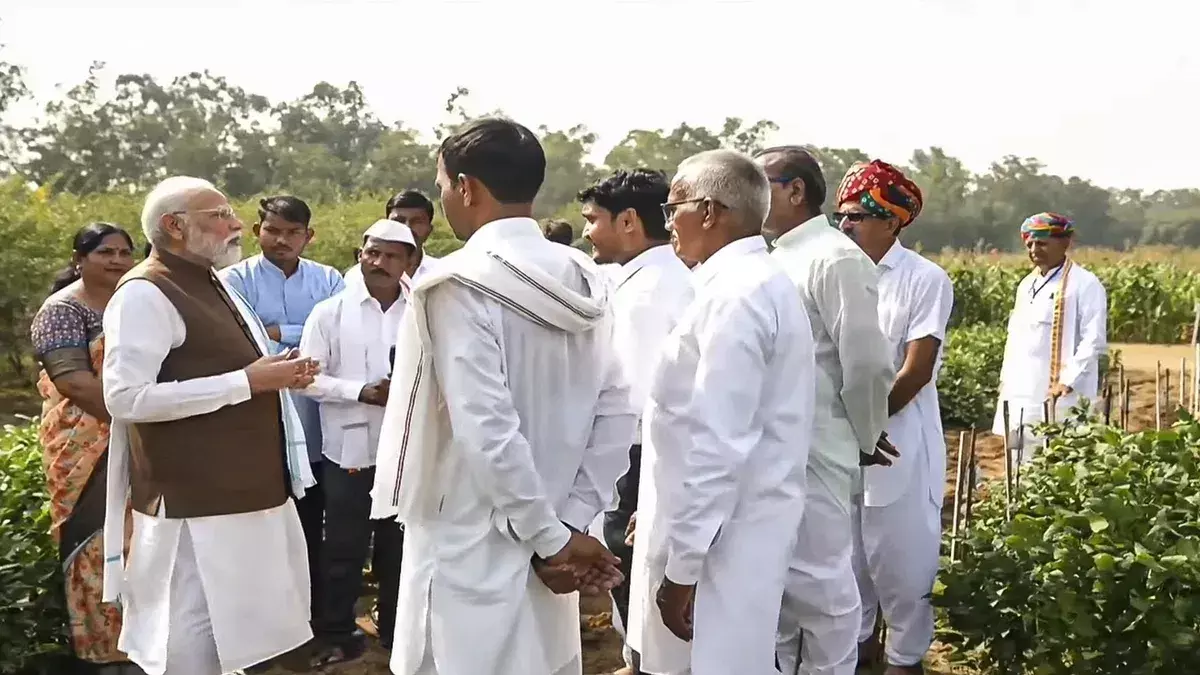
NEW DELHI, Oct. 11 -- Prime Minister Narendra Modi on Saturday launched two major agricultural schemes with an outlay of Rs 35,440 crore to boost pulses production and improve the farm sector growth in 100 low-performing districts, as he exhorted farmers to reduce the country's import dependence and increase exports.
Modi, in a special event at the Indian Agricultural Research Institute (IARI) Pusa campus here, launched a Rs 24,000-crore 'Pradhan Mantri Dhan Dhaanya Krishi Yojana' (PM-DDKY) and a Rs 11,440-crore 'Mission for Aatmanirbharta in Pulses'.
He also inaugurated projects valued at over Rs 5,450 crore in agriculture, animal husbandry, fisheries, and food processing sectors, and laid foundation stone for additional projects worth around Rs 815 crore.
During his 30-minute address, Modi attacked the Congress governments for not having any vision and strategy for the growth of the agriculture and allied sectors, which weakened the farm ecosystem.
Talking about the two new big schemes, the Prime Minister said that the Centre would invest over Rs 35,000 crore in PM-DDKY and pulses mission, which he said would change the "fate of crores of farmers".
The two schemes, already approved by the Cabinet, will be implemented from the upcoming rabi (winter) season till 2030-31.
Modi underscored that farmers have a critical role to play in realising the vision of a developed India (Viksit Bharat) by 2047.
"You (farmers) have made India self-reliant in foodgrains post-Independence. Now, you have a crucial role in making India a developed nation (Viksit Bharat). On one hand, we have to become self-reliant (in food), while on the other hand we should produce for the global market. Friends, we need to knock the doors of the international market," Modi said, urging farmers to focus on crops that have global demand.
"We have to reduce our imports and we should not fall behind in increasing exports," he said, adding that the two new schemes will play a major role in achieving these twin objectives.
Modi urged farmers to diversify beyond wheat and rice, focusing on pulses to ensure protein security. Despite being the world's largest pulses producer and consumer, India still depends on imports, he pointed out.
Under the pulses mission, Modi said the aim is to increase pulses acreage by 35 lakh hectares by 2030 to boost production and achieve self-reliance. The mission targets raising pulses output from the current 252.38 lakh tonne to 350 lakh tonne by 2030-31.
The PM-DDKY, modelled on the government's Aspirational Districts Programme, will target 100 low-performing agricultural districts and integrate 36 schemes from different ministries, he said.
The scheme will focus on enhancing productivity, promoting crop diversification, improving irrigation and storage facilities, and ensuring credit access.
Accusing previous Congress governments for neglecting the farm sector, Modi said the Opposition party lacked "vision" and strategy for the growth of this crucial sector. The Prime Minister said it is important that the farm sector receive the government support, but he rued that previous governments left agriculture to fend for itself.
"There was no vision from the government side for agriculture. There was no strategy, Modi said, adding that the different government departments related to agri functioned independently.
Due to this approach, he said India's agricultural system was continuously weakening.
To achieve higher growth, Modi said it was necessary to bring reform in the agricultural system and the process began when his government took over in 2014.
Modi said he changed the "careless approach" of previous governments towards farming, and brought many reforms in the farm sector, from seeds to the marketplace. The Centre made efforts to increase investment in the farm sector.
He said the government has increased agriculture budget six times in the last 11 years.
Taking aim at the Opposition party, Modi said while the NDA government has given Rs 13 lakh crore subsidy on fertilisers in 10 years, of which Rs 3.75 lakh crore has been provided to farmers under PM-Kisan scheme, Rs 5 lakh crore subsidy was given in 10 years of the UPA government.
Most recently, GST rates on farm machineries and equipment have been reduced, he said, adding this has brought double savings to farmers as the prices of daily use items too have come down.
As a result, Modi said that in the last 11 years, India's agricultural exports have nearly doubled. Foodgrain production has increased by about 90 million tonne, while fruit and vegetable production has grown by more than 64 MT. Under Pradhan Mantri Fasal Bima Yojana, insurance claims worth Rs 2 lakh crore have been disbursed to farmers, he said, and remarked this is not a small amount.
Over the past 11 years, more than 10,000 Farmer Producer Organizations (FPOs) have been formed to enhance farmer cooperation and market access.
Modi noted that this new agricultural initiative draws inspiration from the success of the Aspirational Districts Programme (ADP).
He reiterated that just like the ADP, the responsibilities for the successful implementation of PM-DDKY lie not only on the farmers but also on local government officials, particularly District Magistrate or Collector of each district.
The design of this scheme allows flexibility so that the planning can be tailored according to the specific needs of each district, he said.
During the event, Modi also interacted with farmers engaged in pulses cultivation who have benefitted from various government schemes aimed at establishing a value chain-based approach in agriculture, animal husbandry, and fisheries.
Agriculture Minister Shivraj Singh Chouhan and Fisheries, Animal Husbandry and Dairying Minister Rajiv Ranjan Singh were present at the event.
Published by HT Digital Content Services with permission from Millennium Post.
